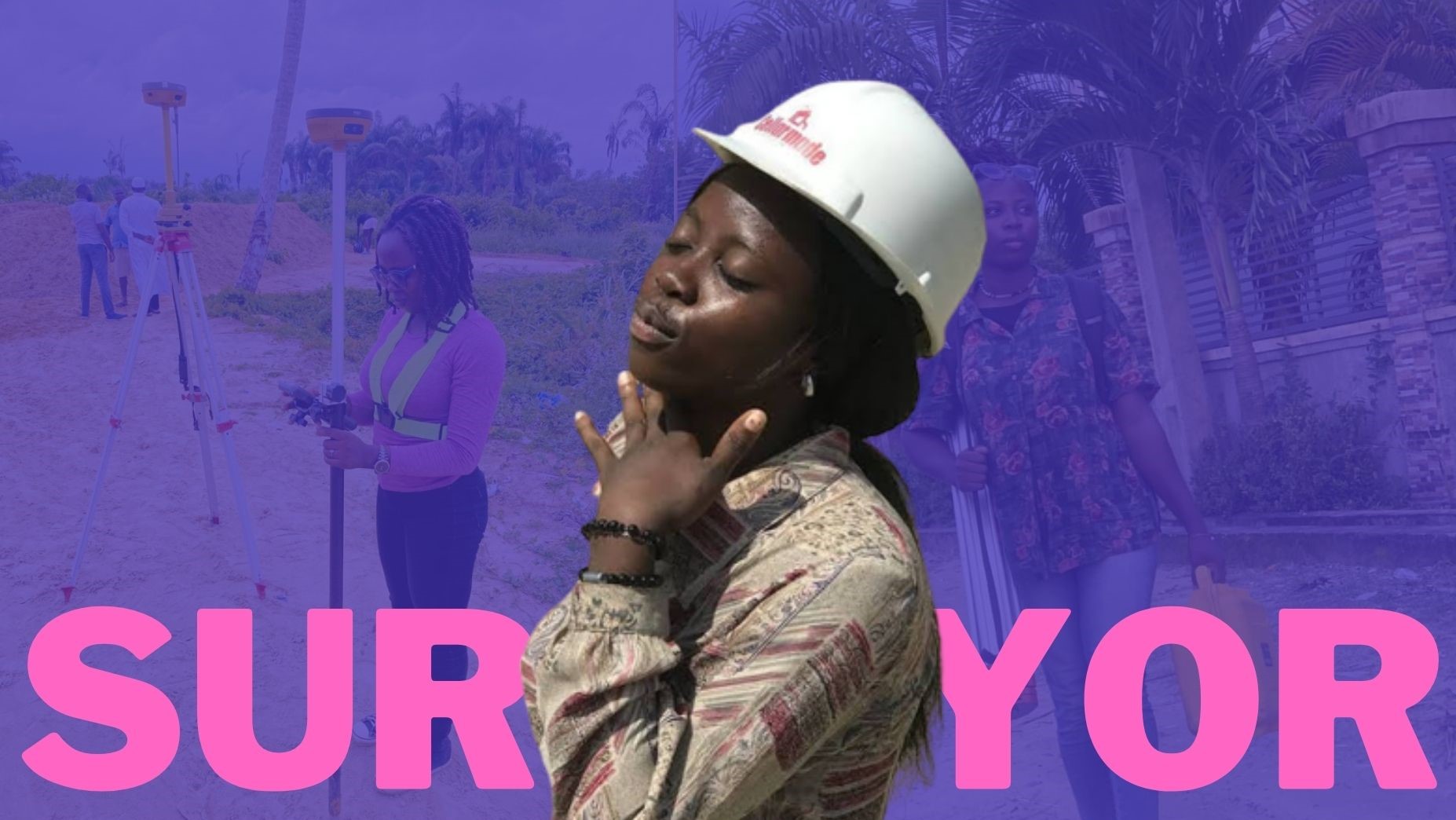In 2021, Olakemi Odunewu declared herself as one of the only few women surveyors. she said she found comfort in the field because of her love for mathematics.
Odenewu also alluded to the absence of female surveyors, adding that one would have met more than ten male professionals before one could find a female surveyor.
” I Will put it at the ratio of 1:10. You also know that there is this tendency of some girls to think that Math is difficult. I believe by the next generation, the numbers would have been more,” she hoped.
But that future still seems far off.
In 2015 when Anthonia Oyetunde opted in for her National Diploma at the Federal School of Surveying, Oyo, Oyo state Nigeria, only fifteen of the 219 student surveyors in her class were women.
She says, “Even most of them have gone out of the profession now, if I am being honest.”
According to Women-In-Surveying, only about 400 women practice surveying in Nigeria as of their last count. What it says is that many women see themselves as unfit for surveying.
Whether they had nurtured the ambition to practice since childhood, or fallen in love with the prospect of being a minority female professional, many women have failed to reach the point of becoming registered surveyors in Nigeria.
Odunewu said it is because of fear of mathematics, the need to set up a family and run a home, alongside the difficulty associated with the discipline and practice that scares women away from the profession.
But could women find their way around it?
Oyetunde is now in her penultimate year at Obafemi Awolowo University, studying Surveying and Geoinformatics. She has also been practising the profession for over two years, having garnered relevant knowledge and experience during her diploma days.
When other women have found zero joy in the discipline, she has loved it since secondary school.
“At my secondary school then, a group of some student surveyors used to come to our school doing something that was boring to many at the time, but I found it quite fascinating, ” she tells Prime Progres, “So one day, I summoned the courage to ask them what it was they were doing and why they were doing so. When they told me they were surveyors, I fell in love with the prospect of doing the same someday,” she said.
They were trying to measure her school for a perimeter survey for one of their projects. Though there were few women among those students, the number of males toppled theirs.
“Women can excel in anything they are interested in. The barriers could exist; the onus is on us to pull them down“.
Oyetubde thinks that women need to draw key strengths from any challenge associated with surveying and all the ramifications of womanhood. She sees the peculiarity as an area women could work around successfully.
“Surveying has different strata. You can venture into some areas that do not require you to carry instruments and do a lot of fieldwork. Women surveyors don’t need to stress themselves, ” she advises.
Another way women could own surveying in no distant future and make their mark is if they do not isolate themselves.
“Let us Move with the right people and Identify our strengths and weaknesses,” she stresses, adding that female student survivors will only climb the ladder if they can masterfully utilise their industrial training programme and every other opportunity that will connect them with industry players.
That’s not to say that Oyetunde is not facing daunting challenges in the profession. “At different points in my life, I have found this field too tasking, boring and unreliable. I have often asked myself, “Is this what I want to do till I’m 60? ” she wonders.
But like herself, who is now tilting towards the data analytical aspect of surveying, GIS Analysis, she tasks women to explore the soft but most in-demand facet of surveying.
“As the world is moving, one will be left behind if one doesn’t move with it. If you are studying surveying and you think you or your physical strength will disallow you from going to the site, explore the emerging and technical sides of the profession”, she puts forward.
She agrees that juggling parenting and surveying as a woman could be tiresomely difficult, even if it is possible at all, but maintains that strategically positioning oneself as an expert in the technical areas will help women surveyors/
In 2021, Olakemi Odunewu highlighted the scarcity of female surveyors, attributing it partly to the common fear of mathematics among women. Despite hopes for increased numbers, the ratio remains skewed. For instance, in 2015, only 15 out of 219 surveyors at the Federal School of Surveying, Oyo, were women, and many have since left the profession.
Women-In-Surveying reported approximately 400 female surveyors in Nigeria, suggesting a widespread self-doubt about fitting into the field. Challenges such as the difficulty of the discipline, family responsibilities, and the fear of mathematics deter many women from pursuing surveying.
However, success stories like Anthonia Oyetunde, who is currently studying Surveying and Geoinformatics at Obafemi Awolowo University, showcase a passion for the field despite its challenges. Oyetunde encourages women to navigate the profession by leveraging strengths and exploring less physically demanding areas of surveying, such as data analytics and GIS analysis.
She advises women to not isolate themselves, to identify their strengths and weaknesses, and utilize every opportunity to connect with industry players. Although combining parenting and surveying can be difficult, strategically positioning oneself in technical areas can ease the balance.






